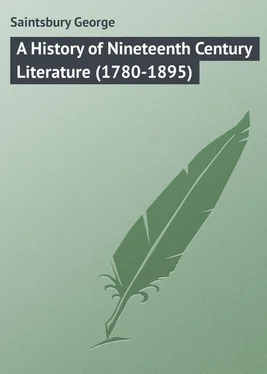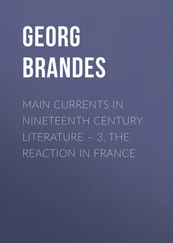George Saintsbury - A History of Nineteenth Century Literature (1780-1895)
Здесь есть возможность читать онлайн «George Saintsbury - A History of Nineteenth Century Literature (1780-1895)» — ознакомительный отрывок электронной книги совершенно бесплатно, а после прочтения отрывка купить полную версию. В некоторых случаях можно слушать аудио, скачать через торрент в формате fb2 и присутствует краткое содержание. ISBN: , Жанр: foreign_prose, на английском языке. Описание произведения, (предисловие) а так же отзывы посетителей доступны на портале библиотеки ЛибКат.
- Название:A History of Nineteenth Century Literature (1780-1895)
- Автор:
- Жанр:
- Год:неизвестен
- ISBN:http://www.gutenberg.org/ebooks/31698
- Рейтинг книги:5 / 5. Голосов: 1
-
Избранное:Добавить в избранное
- Отзывы:
-
Ваша оценка:
- 100
- 1
- 2
- 3
- 4
- 5
A History of Nineteenth Century Literature (1780-1895): краткое содержание, описание и аннотация
Предлагаем к чтению аннотацию, описание, краткое содержание или предисловие (зависит от того, что написал сам автор книги «A History of Nineteenth Century Literature (1780-1895)»). Если вы не нашли необходимую информацию о книге — напишите в комментариях, мы постараемся отыскать её.
A History of Nineteenth Century Literature (1780-1895) — читать онлайн ознакомительный отрывок
Ниже представлен текст книги, разбитый по страницам. Система сохранения места последней прочитанной страницы, позволяет с удобством читать онлайн бесплатно книгу «A History of Nineteenth Century Literature (1780-1895)», без необходимости каждый раз заново искать на чём Вы остановились. Поставьте закладку, и сможете в любой момент перейти на страницу, на которой закончили чтение.
Интервал:
Закладка:
Yet it seems to me impossible, on any just theory of poetry or of literature, to rank him low as a poet. He can afford to take his trial under more than one statute. To those who say that all depends on the subject, or that the handling and arrangement of the subject are, if not everything, yet something to be ranked far above mere detached beauties, he can produce not merely the first long narrative poems in English, which for more than a century had honestly enthralled and fixed popular taste, but some of the very few long narrative poems which deserve to do so. Wordsworth, in a characteristic note on the White Doe of Rylstone , contrasts, with oblique depreciation of Scott, that poem and its famous predecessors in the style across the border; but he omits to notice one point of difference – that in Scott the story interests, and in himself it does not. For the belated "classical" criticism of the Edinburgh Review , which thought the story of the Last Minstrel childish, and that of Marmion not much better, it may have been at least consistent to undervalue these poems. But the assumptions of that criticism no longer pass muster. On the other hand, to those who pin their poetical faith on "patches," the great mass of Scott's poetical work presents examples of certainly no common beauty. The set pieces of the larger poems, the Melrose description in The Lay , the battle in Marmion , the Fiery Cross in the Lady of the Lake , are indeed inferior in this respect to the mere snatches which the author scattered about his novels, some of which, especially the famous "Proud Maisie," have a beauty not inferior to that of the best things of his greatest contemporaries. And in swinging and dashing lyric, again, Scott can hold his own with the best, if indeed "the best" can hold their own in this particular division with "Lochinvar" and "Bonnie Dundee," with Elspeth's ballad in the Antiquary , and the White Lady's comfortable words to poor Father Philip.
The most really damaging things to be said against Scott as a poet are two. First, that his genius did not incline him either to the expression of the highest passion or to that of the deepest meditation, in which directions the utterances of the very greatest poetry are wont to lie. In the second place, that the extreme fertility and fluency which cannot be said to have improved even his prose work are, from the nature of the case, far more evident, and far more damagingly evident, in his verse. He is a poet of description, of action, of narration, rather than of intense feeling or thought. Yet in his own special divisions of the simpler lyric and of lyrical narrative he sometimes attains the exquisite, and rarely sinks below a quality which is fitted to give the poetical delight to a very large number of by no means contemptible persons. It appears to me at least, that on no sound theory of poetical criticism can Scott be ranked as a poet below Byron, who was his imitator in narrative and his inferior in lyric. But it may be admitted that this was not the opinion of most contemporaries of the two, and that, much as the poetry of Byron has sunk in critical estimation during the last half century, and slight as are the signs of its recovery, those who do not think very highly of the poetry of the pupil do not, as a rule, show much greater enthusiasm for that of the master.
Byron, it is true, was only half a pupil of Scott's, and (oddly enough for the poet, who, with Scott, was recognised as leader by the Romantic schools of all Europe) had more than a hankering after the classical ideals in literature. Yet how much of this was due to wilful "pose" and a desire not to follow the prevailing school of the day is a question difficult to answer – as indeed are many connected with Byron, whose utterances, even in private letters, are very seldom to be taken with absolute confidence in their sincerity. The poet's character did no discredit to the doctrines of heredity. His family was one of considerable distinction and great age; but his father, Captain John Byron, who never came to the title, was a roué of the worst character, and the cousin whom the poet succeeded had earned the name of the Wicked Lord. His mother, Catherine Gordon of Gight, was of an excellent Scotch stock, and an heiress; though her rascally husband made away with her money. But she had a most violent temper, and seems to have had absolutely no claims except those of birth to the title of lady. Byron was born in Holles Street, Cavendish Square, on 22nd January 1788; and his early youth, which was spent with his mother at Aberdeen, was one of not much indulgence or happiness. But he came to the title, and to an extremely impoverished succession, at ten years old, and three years later was sent to Harrow. Here he made many friends, distinguishing himself by obtruding mentions and memories of his rank in a way not common with the English aristocracy, and hence, in 1805, he proceeded to Trinity College, Cambridge. He spent about the usual time there, but took no degree, and while he was still an undergraduate printed his Hours of Idleness , first called Juvenilia . It appeared publicly in March 1807, and a year later was the subject of a criticism, rather excessive than unjust, in the Edinburgh Review . Byron, who had plenty of pluck, and who all his life long inclined in his heart to the Popian school, spent a considerable time upon a verse-answer, English Bards and Scotch Reviewers , in which he ran amuck generally, but displayed ability which it was hopeless to seek in his first production. Then he went abroad, and the excitement of his sojourn in the countries round the Mediterranean for the next two years not only aroused, but finally determined and almost fully developed, his genius.
On his return home he took his seat and went into society with the success likely to attend an extremely handsome young man of twenty-three, with a vague reputation both for ability and naughtiness, a fairly old title, and something of an estate. But his position as a "lion" was not thoroughly asserted till the publication, in February 1812, of Childe Harold , which with some difficulty he had been induced by his friend Dallas, his publisher Murray, and the critic Gifford to put before some frigid and trivial Hints from Horace . Over Childe Harold the English public went simply mad, buying seven editions in five weeks; and during the next three years Byron produced, in rapid succession, The Giaour , The Bride of Abydos , The Corsair , Lara , The Siege of Corinth , and Hebrew Melodies . He could hardly write fast enough for the public to buy. Then the day after New Year's Day 1814, he married Miss Milbanke, a great heiress, a future baroness in her own right, and handsome after a fashion, but of a cold, prim, and reserved disposition, as well as of a very unforgiving temper. It probably did not surprise any one who knew the pair when, a year later, they separated for ever.
The scandals and discussions connected with this event are fortunately foreign to our subject here. The only important result of the matter for literature is that Byron (upon whom public opinion in one of its sudden fits of virtuous versatility threw even more of the blame than was probably just) left the country and journeyed leisurely, in the company of Mr. and Mrs. Shelley for the most part, to Venice. He never returned alive to England; and Venice, Ravenna, Pisa, and Genoa were successively his headquarters till 1823. Then the Greek Insurrection attracted him, he raised what money he could, set out for Greece, showed in the distracted counsels of the insurgents much more practical and untheatrical heroism than he had hitherto been credited with, and died of fever at Missolonghi on the 19th of April 1824. His body was brought home to England and buried in the parish church of Hucknall Torkard, near Newstead Abbey, his Nottinghamshire seat, which, however, he had sold some time before. The best of Byron's poems by far date from this latter period of his life: the later cantos of Childe Harold , the beautiful short poems of The Dream and Darkness , many pieces in dramatic form (the chief of which are Manfred , Cain , Marino Faliero , and Sardanapalus ), Mazeppa , a piece more in his earlier style but greatly superior to his earlier work, a short burlesque poem Beppo , and an immense and at his death unfinished narrative satire entitled Don Juan .
Читать дальшеИнтервал:
Закладка:
Похожие книги на «A History of Nineteenth Century Literature (1780-1895)»
Представляем Вашему вниманию похожие книги на «A History of Nineteenth Century Literature (1780-1895)» списком для выбора. Мы отобрали схожую по названию и смыслу литературу в надежде предоставить читателям больше вариантов отыскать новые, интересные, ещё непрочитанные произведения.
Обсуждение, отзывы о книге «A History of Nineteenth Century Literature (1780-1895)» и просто собственные мнения читателей. Оставьте ваши комментарии, напишите, что Вы думаете о произведении, его смысле или главных героях. Укажите что конкретно понравилось, а что нет, и почему Вы так считаете.












